Undying
Glory
Undying Glory
The Solar Path of Greek Heroes
Written by Tom Billinge
Published by Sanctus Europa Press
Revised first edition, originally published December 2020 by Sanctus Europa Press.
This work is copyrighted 2020 by Tom Billinge.
All rights reserved. No part of this book may be reproduced or used in any manner without prior written permission of the copyright owner, except for the use of brief quotations in a review. To request permission, contact the publisher.
Paperback: 978-1-7362937-0-6
Hardcover: 978-1-7362937-1-3
Library of Congress PCN: 9965324301
Editing and layout by Benjamin Sieghart.
Cover art ( Herakles and the Bull and back cover) by skinless_frank.
Inside illustrations ( Perseus , Jason , and Herakles ) by Ben Ervin.
Inside maps taken from the public domain.
More at:
tombillinge.com
sanctuseuropa.com
 The Ancient Greek World (according to Homer)
The Ancient Greek World (according to Homer)
Table of Contents
Part I: Kadmos, Perseus, and Bellerophon
Part II: Jason and the Argonauts
Part III: Theseus, Herakles, and the Solar Path
Acknowledgements
This work would not have been possible without the help of a small group of patient, dedicated people who have been critical in bringing it to fruition.
I would first like to thank my father Mark for his academic and geographical eye on the work, as well as having encouraged my love of ancient history and archaeology as a child, taking me on his field trips to Crete at an impressionable age.
There are also three people who have passed on to the Isles of the Blessed who I wish to thank.
First, my mother Anastasia, from whom I draw my Greek ancestry. Were it not for her, I would not have grown up with a passion for my heritage. The summers spent in her homeland of Cyprus left a lasting impression and allowed me to connect with my Greek roots.
Second, my uncle Michael for having encouraged my love of the classics as a schoolboy. I remember vividly being taken to see a performance of Euripides Medeia and then going to a bookshop where he bought me textbooks for the study of Ancient Greek. I feel particularly blessed that just weeks before his passing, he proofread the Ancient Greek in this book.
Third, the great mythographer Professor Kroly Kernyi, who blazed a trail and left clues for others to follow.
Finally, I owe a huge debt of gratitude to Brett for asking useful questions, Jake for his critical input, and to my editor Ben for his invaluable insights and skill at cutting through to the heart of my work.
Most importantly, I dedicate this work to my wife Kristin for her patience, wisdom, and support.
Preface
This book is based in Greek mythology, but is an esoteric work intended to help men better understand their place in the world. It attempts to reconstruct a version of native European spirituality. This is not an academic thesis.
The Greek myths are often told to children from various cultures around the world, as they are exciting and accessible. They are, in this sense, adventure stories. Academia has looked at these stories through several lenses.
The heroes can often be presented as Achaian lords and chieftains moving into Greece from the north, replacing the native Mother Goddess religion with an Olympian religion based around the Indo-European Sky Father. This is particularly evident with the story of Theseus and the wresting of power from Minoan Crete.
The heroes and gods have also been looked at by psychologists as archetypes. This is particularly true of the Jungian tradition.
This work does not contradict other interpretations of the Greek hero mythos. It also doesnt attempt to amalgamate them into a singular narrative either, as doing so would be an impossible task. Rather, this book aims to look at these myths and the symbolism that lies hidden in them. It tries to draw out and examine the wisdom embedded in the stories.
There is no definitive version of any hero myth presented in this book. Each tale has drawn from the available ancient material from Hesiod and Pindar to Apollonios, Pseudo-Apollodoros, Hyginus, Ovid, and many other fragments. The goal is to present common elements of each story and find universal themes that remained constant in each version.
For the purposes of this book, the myths can be looked at in two ways. First, as the Greeks saw them: as real as the gods themselves. Someone looking at them from this perspective is given a clear, ancestral, upward path to spiritual transcendence. The other way one can view them is as an allegorical collection of ancient wisdom.
In essence, whether one believes in the veracity of the myths or not, the moral guidance is more than valuable. It is necessary in the rootless society we find ourselves today. The heroic values these myths present are timeless, and as vital today as they were 2500 years ago.
The upward path of the hero promotes spiritual and moral growth. It is a path that rejects a nihilistic, fatalist worldview and encourages men to act and seek that which is higher. It is a path of striving the path of a strenuous life that rewards the hero for his efforts.
Those who tread this path aim to realise their full potential and become more than human animals drifting aimlessly along the river of life. The hero swims against the current and crosses the ocean to explore distant lands, reaching further and aiming higher.
He dedicates his actions to his supreme self, to the god-man within. He becomes self-reliant, not looking for external solutions to his dilemmas, knowing that he is his own saviour. He remains vigilant over his thoughts and deeds, purifying his mind, body, and spirit.
Do not be content with a shiftless life. Aim higher. Tread the path of Undying Glory.
Notes on the Context
The Greek Age of Heroes was the last glimmer of a Golden Age. This age was the pinnacle of a civilization deep in the past, and now lost to history.
Tales of Greek heroes impart a message from that time to all of us in this Age of Iron. Aside from Herakles, heroes like Perseus, Theseus, Jason, and the combatants of the Trojan War all set an example to us, much as they did to the Ancient Greeks.
They knew the stories and what their themes represented. They understood the need to both honour the gods and to struggle against them. They knew that the gods do not want us to succeed on the Solar Path.
The Spartans were the most martial of the later Greeks. They drew their heritage from Herakles, with the royal houses of Sparta and the Spartiate nobility claiming descent. The Spartans also revered Apollon over all other gods. The Hyakinthia, Gymnopaidia, and the Karneia festivals were all dedicated to the Light Bringer.
The Spartans made the link between Herakles and the Solar Path of Apollon, using it to inform their worldview. It is for this reason the Spartans still live on in the modern imagination in a way the Athenians and Thebans do not.
Almost all personal names and most place names use phoneticised Greek spellings rather than the later Roman spellings. For example, Apollon is used instead of Apollo, Medousa for Medusa, Kirke for Circe, and Delphoi for Delphi. Exceptions to this rule are when a name or location is so familiar with its anglicised spelling that to render it in Greek would only confuse. For example, Crete is used rather than Krete and Corinth rather than Korinthos. Another exception is the use of the personal name Jason, which in Greek is Iason.
The tales are set in an ancient past that is overlaid on the geography of the Late Greek Bronze Age (around 1600 to 1100 BCE). This geography may seem somewhat unusual to the modern mind. The Greeks believed that their world, the land surrounding the Mediterranean Sea and stretching from the Hyperborean lands in the north to the African lands in the south, was encircled by a great river. This World River was personified by a Titanic god called Okeanos: a primal deity who did not allow men to pass beyond to the magical otherworldly lands of sunrise and sunset.
Next page
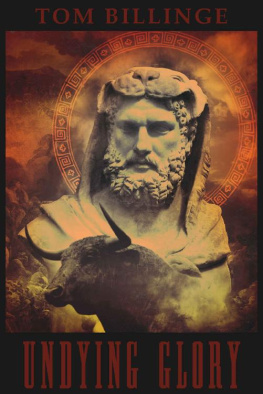

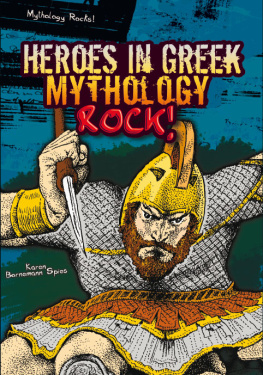


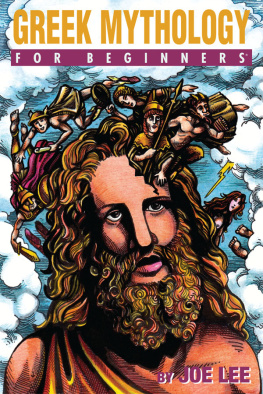
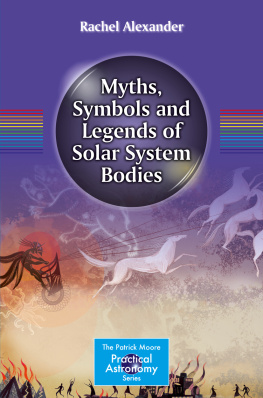
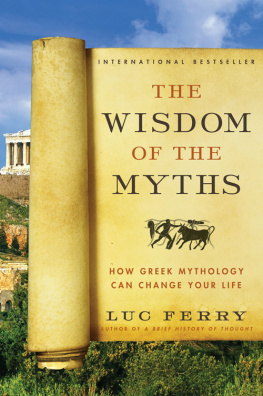
 The Ancient Greek World (according to Homer)
The Ancient Greek World (according to Homer)